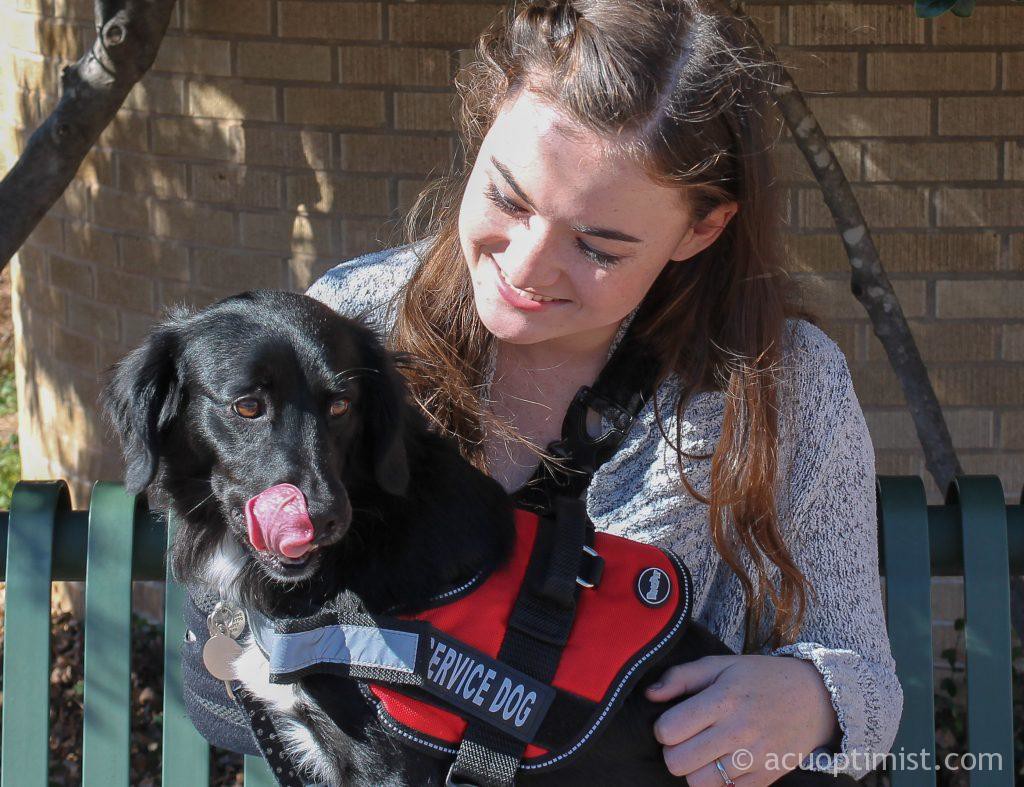“He is not really a family pet, he is a little different,” Gessler said.
Gessler, was traveling on January 2 when she ran into a problem trying to find lodging. Though she made reservations with a local motel, when she arrived with Cozmo the manager asked her to leave, citing a no-pet policy.
“It was a really ugly feeling I had,” Gessler said.
The Americans with Disabilities Act states service dogs are not pets and are allowed in most public places, even if the business has a no-pet policy. Businesses that don’t accommodate a service dog are violating the law.
Gessler left the motel and found lodging elsewhere, but even there she didn’t receive a warm welcome. The second motel charged her an extra $10 for Cozmo to stay in the room, again against the ADA. She said the motel staff also asked for evidence or proof Cozmo was a service dog, also an illegal request.
“I find hotels very, very difficult to deal with,” Gessler said, adding she has had issues many times across the country.
The ADA clearly states businesses are only allowed to ask two questions regarding a service animal — “is the dog a service animal required because of a disability? And what work or task has the dog been trained to perform?”
Staff cannot ask for proof of a disability or ask for the dog to demo a task. Service dogs do not have to be specially licensed or registered and the owners do not have to carry special papers on them.
In Gessler’s case, her disability isn’t visible from the outside. It is an “invisible disability”.
“I deal with military post traumatic stress disorder,” Gessler said, who served 18 years in the military and did tours of duty during the Iraq War. She suffers from extreme anxiety, depression and even traumatic nightmares. In public, she can find it difficult to function, especially in unfamiliar places, such as when sleeping in a strange hotel room.
Cozmo, who has been with Gessler for 8 years, is trained to help Gessler remember to take her medication, help her through anxiety attacks, keep people at a distance when she is feeling uncomfortable, search strange rooms, bring her a phone when she needs to dial for help and many other tasks and commands. At night, Cozmo sleeps under Gessler’s bed, and will wake her from a nightmare or if she is deeply asleep due to her medications and depression and doesn’t respond to her alarm.
“Corgis are smart little dogs. This corgi is unbelievable,” Gessler said.
Service dogs who help with PTSD, other mental disabilities and diseases such as diabetes, epilepsy and heart disease are increasingly more visible. There are service dogs which can tell when its human partner is about to have a seizure, knows when a diabetic’s sugar levels are too high or too low and can even sense a chemical imbalance or blood pressure change, which can signal a cardiac event.
With so many different types of conditions, a wide range of breeds are now becoming trained service dogs. While a golden retriever might be good for a seeing eye dog, a dog as small as a Yorkie can be perfect as a PTSD service dog, depending on the person’s needs.
“It doesn’t matter the breed, as long as it finished the training. The breed is changing,” Gessler said.
The ADA make it possible for those with disabilities and service animals to live fuller lives.
“It facilitates those with disabilities to enjoy a life like we do. Why should that be denied to people with disabilities,” Commissioner Kevin Lindsey of the Minnesota Department of Human Rights said.
Dan McElroy, executive vice president of the Minnesota Lodging Association, said his organization puts out a legal guide each year for hotels, motels, resorts and other lodging businesses, outlining state and federal laws, including the ADA and service dogs.
He added many branded hotels educate their staff as well.
“We should accept service animals,” McElroy said.
One of the biggest problems facing businesses in regard to service dogs is fraud, McElroy said. There have been cases of people falsely proclaiming their animal as a service animal to get around a no-pet policy. This is illegal.
The ADA states only dogs, and in rare cases miniature horses, are considered service animals under the law. There is also a distinction between emotional support animals and service animals. Emotional support animals do not need special training and are not covered under the ADA.
However, because the ADA gives very little recourse for public places and businesses to question or not accept a service dog onto the premise, McElroy believes it is better to be safe than sorry.
“When in doubt, accommodate the dog as a service dog,” McElroy said.
Lindsey said with the aging population and more medical issues helped with the assistance of a service animal, it is going to become even more common to see service dogs in public spaces.
“The idea of people bringing service animals won’t be that unusual. They’re going to become more prevalent. It is nothing to be afraid of,” Lindsey said.
Gessler hopes the public and businesses become more educated about service dogs, especially those who serve a growing number of veterans with PTSD, traumatic brain injuries and other mental health issues. While the ADA accepts PTSD and mental illness service dogs, the Veterans Administration does not, though the VA is doing a three-year study on it.
“Society isn’t ready for this PTSD service dog,” Gessler said, and it leads to situations similar to the one Gessler found herself in while in Willmar.
“I would like businesses to be aware of the dos and don’ts of the law,” Gessler said.






 Former Army Spc. Kermit Scott was counting the days until Nov. 19, when he was to be admitted to a 30-day in-patient program run by the Veterans Affairs Department in Washington state.
Former Army Spc. Kermit Scott was counting the days until Nov. 19, when he was to be admitted to a 30-day in-patient program run by the Veterans Affairs Department in Washington state.